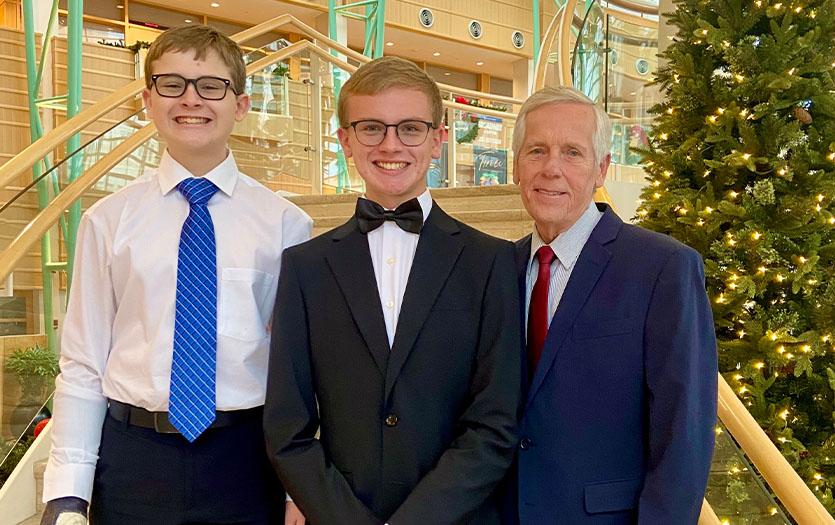
Mike Panyard, 74, is a smart man. “I know to listen to my doctors,” he said, when we spoke with him recently. It’s a mindset that gave the Fort Wayne man a second lease on life.
Eight years ago, during a routine annual exam, Mike’s primary care provider, Robert Muller, MD, PPG – Family Medicine and Primary Care, broached the idea of him having a SmartLung CT Scan. “He said, Mike, you smoked for more than 40 years, it’s been a few years since you quit, I think we need to take a look and see if anything comes up.”
Mike scheduled the lung CT scan, and the results came back showing a small, approximately 2-centimeter spot on the upper left lobe of his left lung. “It wasn’t very big,” Mike said. “So, they weren’t too concerned, but Dr. Muller said we’d keep an eye on it.”
Then, last fall, at Mike’s annual exam, Dr. Muller circled back. “He wanted me to have a follow-up CT scan and see if anything had changed,” Mike recalled. He went back for a second SmartLung and the spot had grown to approximately 2.9 centimeters.
“Dr. Muller called and said he wanted me to meet with an oncologist,” Mike said.
The diagnostic journey
Mike met with Patricia Rich, MD, at the Parkview Packnett Family Cancer Institute to review his SmartLung CT scan results and discuss the best next steps. “Dr. Rich didn’t think it looked like a fully formed cancer cell, but she wasn’t sure,” Mike said. “So she wanted to wait three months and do a third lung CT scan.”
This time, Dr. Rich shared with Mike that she believed he did have a cancerous growth. “She told me she thought it was cancer but wanted to schedule a biopsy to confirm.”
The results came back: Early stage 1 mesothelioma.
Quick intervention
“Dr. Rich suggested I get ahold of a cardiologist,” Mike shared. “I’d seen Dr. [Douglas] Gray about five years prior for some calcification that was causing blockages and cramping in my legs. He was able to get me squared away with some medication.”
So, Mike returned to Dr. Gray for a consultation, and he said, “I didn't have to do surgery last time but unfortunately I do this time.”
Dr. Gray explained that he would perform a muscle-sparing surgery, going through Mike’s side, between his ribs, to take the whole upper left lobe. “I asked why he couldn’t just take the spot out, and he told me the imaging showed little fingers protruding out of the mass, and he didn't want to miss anything that would mean he had to go back in later to take more out. He’s been at it for more than 30 years, so I trusted that he knew what he was doing!”
Mike and his care team were hopeful that the cancer hadn’t reached the lymph nodes.
Dr. Gray performed Mike’s lobectomy procedure at Parkview Regional Medical Center on May 6, 2024. One of the first things the surgeon shared with Mike when he woke up was, “we got it all.”
Post-op optimism
Mike said his recovery was, “normal,” and he didn’t encounter any complications, aside from a painful reaction to morphine, which his care team resolved. “All of the people who took care of me were wonderful,” he said. “Very professional and nurturing. They kept my spirtis high.”
Mike had three large and one small tube following the procedure. “I stayed in the hospital for five days, had all of the tubes removed, and returned home to finish healing.”
Mike followed up with Dr. Rich after three months and she confirmed that he was cancer-free. The disease had not spread to his lymph nodes and the surgery was a success. “Hearing her say I was ‘cancer-free for now,’ I lost it. It was very emotional.”
Mike will continue to follow up with Dr. Rich for surveillance every six months for the next three years. “I’ll follow their instructions.”
The value of early detection
Almost a year after his second suspicious scan and on the other side of his surgery, Mike has no doubt that Dr. Muller changed the trajectory of his life. “I would have never given a thought to my cancer risk if Dr. Muller hadn’t mentioned it,” he said. “He was my lifesaver. Even Dr. Gray said I could thank Dr. Muller for catching the cancer so early.”
Mike gave his primary care provider a thoughtful card and gift to show his gratitude. “Dr. Muller told me it wasn’t necessary, but I told him it absolutely was. He saved my life.”
Mike’s message
While Mike smoked for more than four decades, he quit at the recommendation of Dr. Muller. “As many times as you hear it, it is such an addiction that’s hard to break. I did it cold turkey a few years ago, but there are a lot of alternatives that can help. Set it in your mind that you've got to stop and get a scan and see if your lungs have been damaged.”
He shared that the process for the SmartLung CT scan was easy, and proved to be an invaluable tool in catching the disease early. “Hearing the word ‘cancer,’ is emotional,” Mike said. “I was the first person in my family to have it, and thankfully, these doctors saved my life. The scans didn’t even take 15 minutes. If you have any reason for concern, get in and get one. It could save your life.”



